How Generative AI for CX Transforms Customer Experience

Generative AI for CX has redefined how businesses approach customer experience in 2025. Companies now use advanced solutions like Sobot AI and the Sobot call center to deliver instant, tailored support across channels. Sobot’s mission centers on innovation and customer-centricity, helping customers achieve measurable results. For example, AI-driven segmentation has saved businesses up to 2.5 billion hours each year, while 92% of organizations plan further investment in personalization.
| Statistic / Insight | Value / Description |
|---|---|
| Financial services leaders identifying customer experience and support as top AI potential area | 53% |
| Global organizations measuring AI adoption value | 88% |
| Leaders expecting generative AI/AI to drive innovation | 85% |
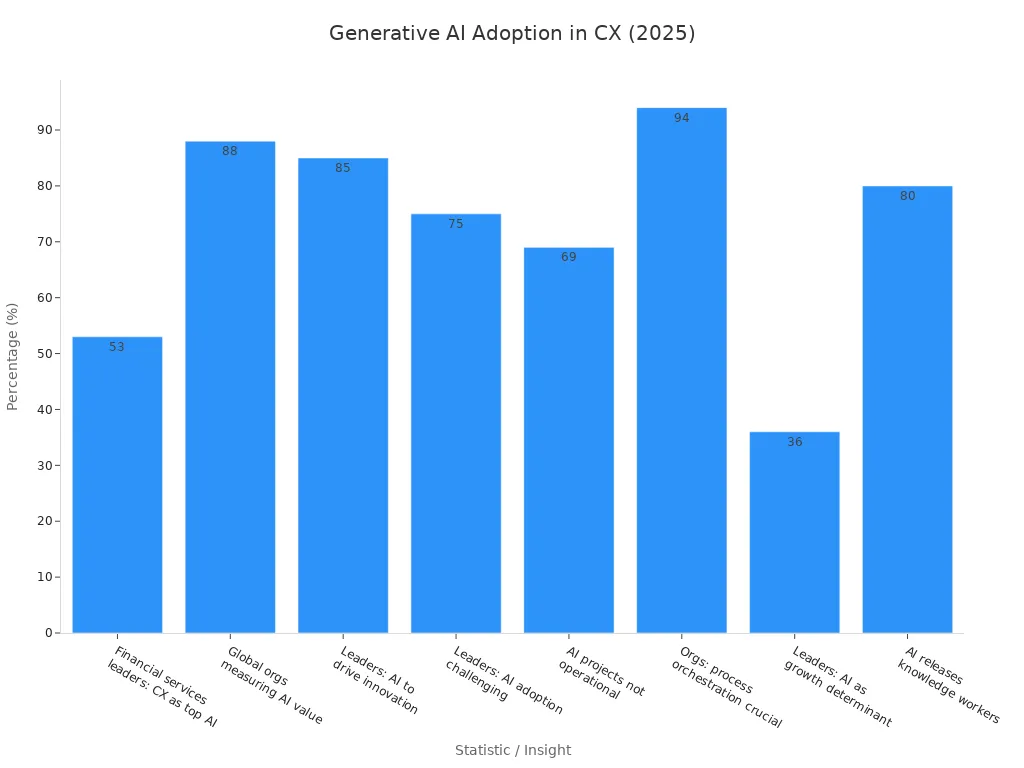
Organizations seek practical solutions for efficiency, security, and trust. Sobot empowers customers to automate routine issues and boost agent productivity, setting a new standard for customer experience management.
Generative AI for CX Transformation
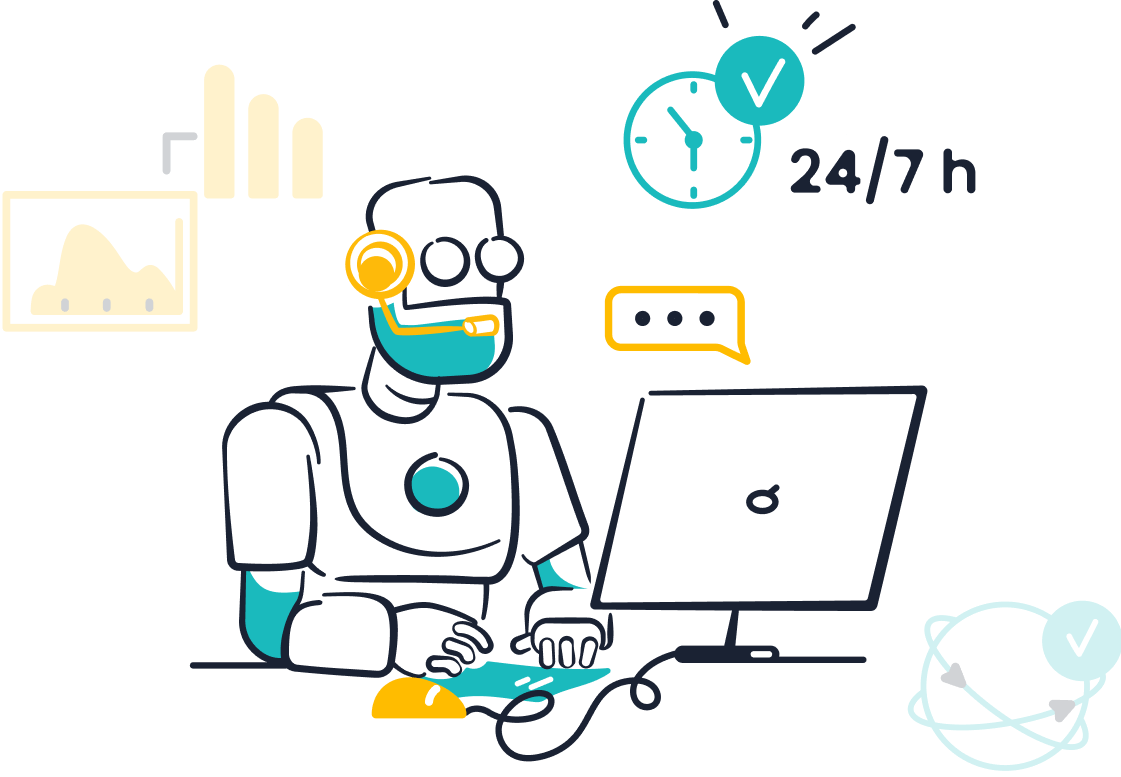
Efficiency in Customer Service
Generative AI for CX brings a new level of efficiency to customer service. Companies now use digital agents in contact centers to handle routine questions and complex issues. Unlike traditional systems, generative AI understands context and adapts responses in real time. This technology helps agents solve problems faster and reduces wait times for customers. Studies show that digital agents powered by generative AI increase agent productivity by up to 35% for less experienced staff and 14% overall. These digital agents share knowledge from top performers, helping all agents improve. As a result, customer service teams resolve more issues per hour and see higher satisfaction scores. Companies also report lower agent turnover, as digital agents make jobs easier and more rewarding.
Personalization and Proactive Support
Generative AI for CX enables deep personalization and proactive support. Digital agents analyze customer data and behavior to offer tailored recommendations and solutions. This approach leads to higher customer satisfaction and loyalty. For example, 84% of executives now use AI to deliver faster information, reduce wait times, and provide personalized responses. Generative AI adapts to new trends and learns from every interaction, making customer service more dynamic. Companies using digital agents see improved service, streamlined workflows, and better analytics. The chart below shows the impact of generative AI on key customer support metrics:
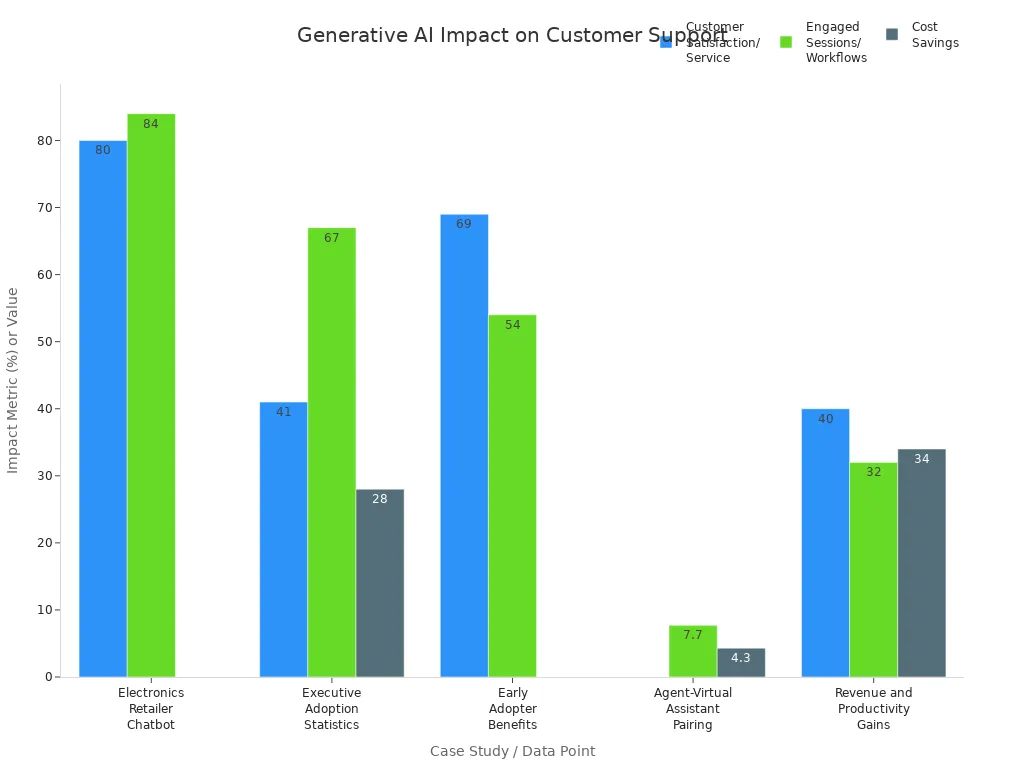
Sobot Chatbot Integration
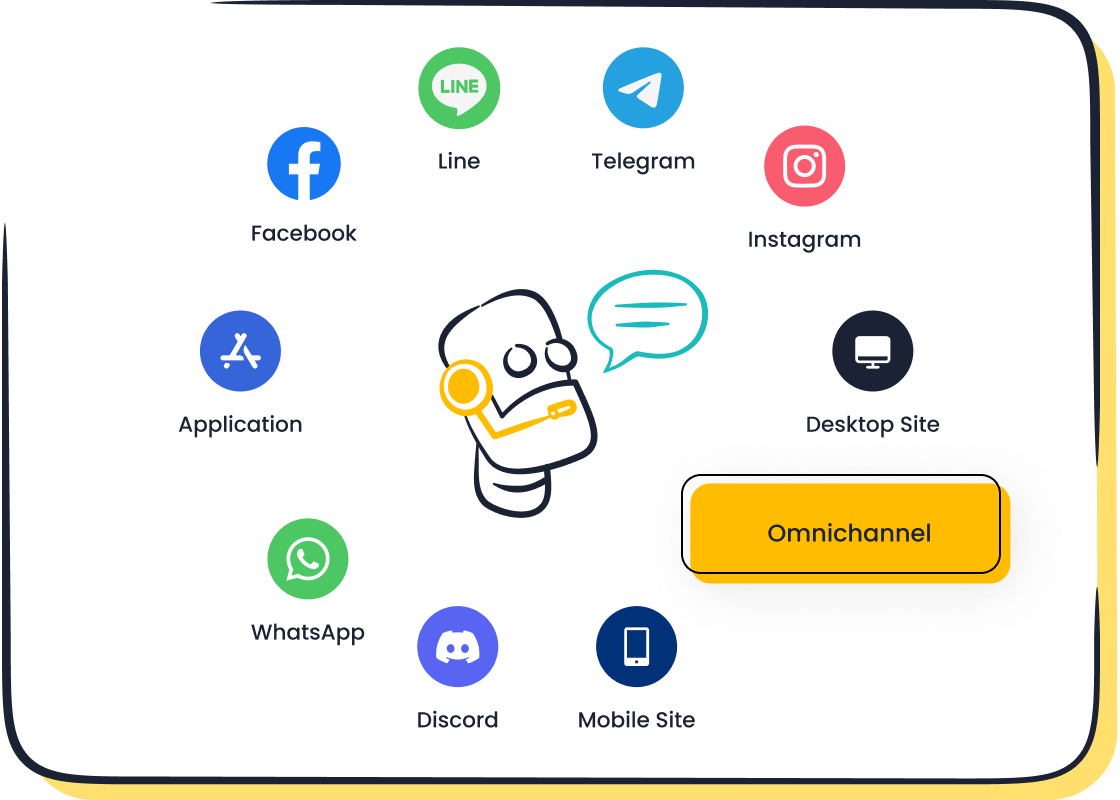
Sobot’s AI-driven chatbot transforms customer experience in the contact center. The chatbot uses generative AI for CX to deliver context-aware, multilingual support across channels. OPPO, a global smart device leader, integrated Sobot’s chatbot and saw an 83% resolution rate and a 57% increase in repurchase rate. The chatbot combines digital agents with human support, ensuring seamless handoffs and consistent service. Sobot’s solution uses artificial intelligence to predict customer needs and automate engagement, making every interaction efficient and personal. This integration shows how generative AI, digital agents, and AI-driven automation can elevate customer interactions and drive business growth.
Benefits
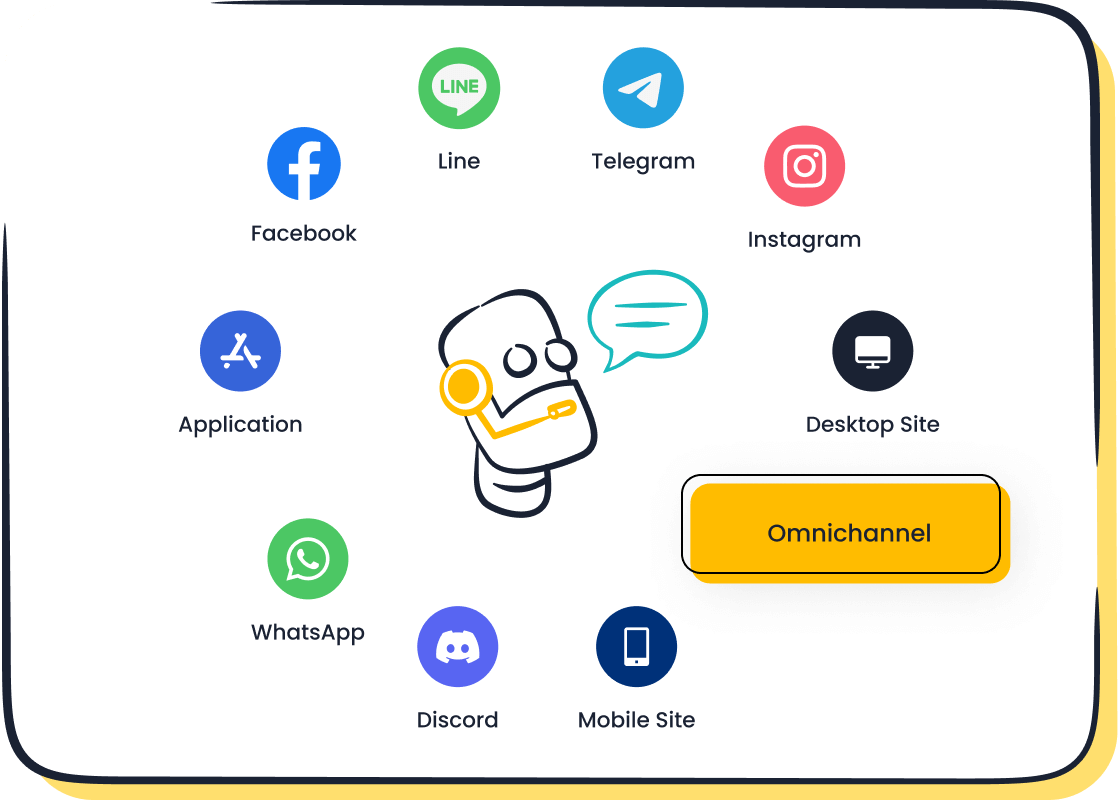
Improved Customer Satisfaction
Generative AI delivers measurable improvements in customer satisfaction across every contact center. Organizations that adopt digital agents see faster response times, more accurate answers, and a seamless experience for customers. For example, a telecom firm using AI-powered digital agents reported a 25% increase in customer satisfaction and a 40% reduction in response times. These results show how digital agents transform the contact center into a hub of efficiency and care.
Personalization stands at the core of these improvements. Digital agents analyze customer data and provide tailored recommendations, which leads to higher loyalty and repeat purchases. Companies that invest in customer experience management with generative AI report an 84% increase in revenue and a 1.5x boost in customer loyalty rates. Sobot’s AI Chatbot, for instance, enables 24/7 multilingual support and proactive engagement, ensuring every customer receives timely and relevant assistance. OPPO, a global smart device leader, achieved a 94% positive feedback rate and a 57% increase in repurchase rate after integrating Sobot’s chatbot into its contact center operations.
Note: A high correlation exists between improved customer experience and increased repurchasing behavior. Even modest investments in customer experience management can yield significant returns, with some companies gaining an average of $775 million over three years.
| Metric / Case Study | Result |
|---|---|
| Telecom firm AI implementation | 25% increase in customer satisfaction, 40% faster response times |
| Apparel brand AI recommendation engine | 35% increase in average order value, 28% boost in conversion rates |
| AI customer service market growth | From $12.06B in 2024 to $47.82B by 2030 (CAGR 25.8%) |
These statistics highlight the direct link between digital agents, customer satisfaction, and business growth. As more organizations embrace generative AI, the contact center becomes a strategic asset for customer experience management.
Cost Reduction
Generative AI brings substantial cost reduction to the contact center. Digital agents automate routine tasks, reducing the need for large teams of human agents. This automation leads to lower operational costs and faster service delivery. Industry data shows that AI-driven automation can accelerate ticket processing by up to 80% and increase resolution rates by 68%. Companies also see a 56% reduction in escalation rates, which directly lowers support costs.
Sobot’s AI Chatbot exemplifies these benefits. By handling regular queries autonomously, the chatbot improves productivity by 70% and saves up to 50% on additional agent costs. The chatbot operates around the clock, ensuring that customers always receive support without the need for overtime or extra shifts. This efficiency allows businesses to allocate resources more effectively and focus on complex customer needs.
Tip: Organizations can further optimize costs by choosing the right infrastructure for their generative AI solutions. Cloud-based platforms offer scalability, while on-premises options provide long-term cost control. Sobot’s flexible deployment options help businesses manage expenses while maintaining high performance in the contact center.
Generative AI also reduces post-call work by 40-50%, freeing agents to handle more interactions and improving overall efficiency. These cost savings make generative AI a compelling choice for any organization seeking to enhance customer service while controlling expenses.
Agent Productivity
Digital agents play a crucial role in boosting agent productivity within the contact center. By automating repetitive tasks, digital agents allow human agents to focus on complex and high-value interactions. This shift not only improves job satisfaction but also increases the number of issues resolved per hour.
Organizations report a 14% increase in issue resolution per hour and a 9% reduction in time spent handling issues after implementing generative AI. Agent attrition drops by 25%, and requests to speak to managers decrease, reflecting a more empowered and effective workforce. Sobot’s AI Chatbot supports agents by providing real-time suggestions, instant summaries, and access to a comprehensive knowledge base. This support enables agents to deliver accurate and consistent service, even during peak periods.
| Productivity Contribution | Description | Metrics / KPIs | Real-World Insight |
|---|---|---|---|
| Automating repetitive tasks | Enhances efficiency and frees time for innovation | Time saved, process benchmarking, output quality | AI customer support reduced response times by 35% |
| Employee enablement and CX improvement | Improves decision-making and customer satisfaction | Employee enablement, customer satisfaction (NPS) | 86% enterprises saw 6%+ revenue increase using Gen AI |
| Measuring ROI and strategic value | Combines quantitative and qualitative KPIs for comprehensive assessment | Revenue growth, cost savings, productivity gains, innovation metrics | Amazon Alexa case: initial cost but long-term ecosystem value |
Sobot’s contact center solutions use digital agents to streamline workflows, reduce manual workload, and enhance agent performance. The result is a more productive team that can handle higher volumes of customer service requests without sacrificing quality.
Sobot Chatbot Value
Sobot’s AI Chatbot stands out as a leading solution for contact center transformation. The chatbot integrates seamlessly with existing systems, providing omnichannel support across chat, email, voice, and social media. Its multilingual capabilities ensure that customers receive support in their preferred language, enhancing accessibility and satisfaction.
The chatbot’s impact on the contact center is clear:
- 70% productivity boost: Digital agents handle routine queries, allowing human agents to focus on complex cases.
- 50% cost savings: Automation reduces the need for additional staff and lowers operational expenses.
- 20% conversion increase: Proactive messaging and real-time intent assistance drive higher sales and engagement.
- 30% more leads: Customizable workflows help businesses capture and nurture more prospects.
Sobot’s chatbot also supports customer experience management by providing detailed analytics and reporting. Businesses can track performance, identify gaps, and optimize their contact center operations for continuous improvement. The chatbot’s no-code setup makes it easy to deploy and customize, ensuring a smooth implementation process.
Callout: Sobot’s commitment to innovation and customer-centricity has earned the trust of over 10,000 brands worldwide. Companies like OPPO, Samsung, and Luckin Coffee rely on Sobot’s digital agents to deliver exceptional customer service and drive business growth.
By leveraging Sobot’s AI Chatbot, organizations unlock the full benefits of generative AI in the contact center. They achieve higher customer satisfaction, lower costs, and greater agent productivity, all while enhancing their customer experience management strategy.
Challenges
Generative AI has transformed customer experience management, but organizations face several challenges when adopting these advanced technologies. Addressing these challenges is essential for building trust, ensuring compliance, and delivering reliable service. Sobot recognizes these industry-wide issues and has developed robust solutions to help businesses overcome them.
Data Privacy and Compliance
Data privacy and security remain top concerns for organizations implementing generative AI in customer experience. Companies often handle sensitive customer information, including personal details, financial records, and behavioral data. The risk of data leakage or unauthorized use increases as AI systems process large volumes of information. Approximately 8.5% of employee prompts to AI tools contain sensitive data, such as customer information and employee PII. Employees may use generative AI for efficiency without understanding the risks, which can lead to inadvertent data exposure and violations of regulations like GDPR, HIPAA, and CCPA.
Organizations must comply with strict privacy laws, which require clear consent, data minimization, and regular Data Protection Impact Assessments (DPIAs). Common challenges include:
- Inadvertent leakage of sensitive or proprietary information.
- Unauthorized use of data for model training without explicit consent.
- Exposure of prompt histories and difficulties complying with evolving regulations.
To address these challenges, Sobot implements privacy by design, conducts DPIAs, and enforces AI governance. The platform restricts data inputs, uses synthetic or anonymized data, and provides employee training on responsible AI use. Sobot’s solutions feature robust encryption, controlled access, and audit trails to ensure data privacy and security throughout the AI lifecycle. These measures help organizations reduce the risk of data breaches, regulatory noncompliance, and reputational damage.
Tip: Regularly monitor AI usage and deploy Data Loss Prevention (DLP) tools to minimize the risk of sensitive data exposure.
Sobot’s commitment to compliance and transparency helps businesses build trust with customers and regulators. The company’s AI solutions support GDPR, CCPA, and other major privacy frameworks, ensuring lawful processing and respect for individual rights.
Integration Issues
Integrating generative AI into existing customer experience systems presents significant challenges. Many organizations struggle with the complexity of connecting AI tools to legacy platforms, CRM systems, and communication channels. Data security and privacy concerns also arise during integration, especially when processing sensitive customer data.
Key integration challenges include:
- Lack of internal technical expertise for AI deployment.
- Training and expertise gaps, with 62% of desk workers lacking proficiency and 70% of leaders doubting team capabilities.
- Difficulty sourcing high-quality, diverse training data.
- High costs associated with AI development and ongoing maintenance.
- Ensuring seamless handoffs between AI and human agents to maintain a human touch.
Sobot addresses these challenges by offering flexible, scalable AI platforms with API-based integration. The company collaborates with IT experts and provides comprehensive training programs to bridge skill gaps. Sobot’s omnichannel solutions unify chat, email, voice, and social media, making integration straightforward and efficient. The platform enforces strong data governance, cybersecurity protocols, and continuous monitoring to protect customer data during and after integration.
Organizations can further reduce integration challenges by:
- Investing in workforce training and early access to AI tools.
- Partnering with experienced AI and customer experience providers.
- Planning budgets to cover both upfront and ongoing expenses.
- Designing AI systems with privacy by design, anonymization, and transparency.
Note: Continuous learning AI systems, like those used by Sobot, help organizations refine customer insights and adapt to changing needs. This approach supports hyper-personalization and dynamic content generation, improving customer experience outcomes.
Trust and Ethical Concerns
Building trust in generative AI remains a critical challenge for organizations. Customers expect transparency, fairness, and accountability from AI-driven interactions. However, AI systems can struggle with emotional nuances, leading to impersonal experiences and potential loss of empathy. Privacy concerns also arise from the extensive data collection required for AI to function effectively.
Trust issues often stem from:
- Algorithmic biases embedded in training data or system design, which can result in unfair or discriminatory outcomes.
- The risk of job displacement as AI automates routine customer support tasks.
- The potential for AI to generate misleading or unethical content, known as hallucinations.
- Public perception and societal impact, including concerns about the loss of human connection.
To address these trust and ethical and bias considerations, Sobot employs a hybrid approach that combines AI efficiency with human empathy. The platform allows seamless escalation from digital agents to human agents, ensuring personalized and empathetic service. Sobot complies with data protection regulations, securing explicit user consent and maintaining transparency in AI use.
Sobot’s AI solutions include:
- Bias detection and mitigation through diverse training data and regular audits.
- Transparency and accountability mechanisms, such as explainable AI decisions and audit trails.
- Robust data security measures, including encryption, access controls, and incident response plans.
- Continuous monitoring and employee training on ethical AI use and regulatory compliance.
Callout: Ethical AI deployment policies balance operational efficiency with social responsibility. Sobot supports workforce reskilling and transparent communication to maintain trust and minimize negative societal impact.
Human oversight remains essential for correcting errors, making ethical judgments, and maintaining control over AI systems. Sobot’s commitment to ethical and bias considerations ensures that organizations can leverage generative AI while upholding the highest standards of fairness, transparency, and accountability.
| Challenge | Sobot’s Approach | Outcome |
|---|---|---|
| Data privacy and security | Encryption, privacy by design, compliance frameworks | Reduced risk, regulatory trust |
| Integration | API-based, omnichannel, training, expert support | Seamless deployment |
| Trust and ethics | Hybrid AI-human, bias audits, transparency | Customer confidence |
Generative AI offers immense potential for customer experience management, but organizations must address these challenges to realize its full benefits. Sobot’s secure, reliable, and ethical AI solutions empower businesses to build trust, ensure compliance, and deliver exceptional customer experiences.
Implementation
Best Practices
Successful deployment of generative ai in cx starts with a clear strategy. Companies should first evaluate their customer service needs, identifying common questions and pain points where generative ai can make a difference. Selecting the right ai solution is crucial. The platform must offer seamless integration, scalability, and strong language understanding. Teams should train and fine-tune the ai model using real customer data, ensuring accuracy and alignment with the brand. Integrating generative ai into existing workflows requires clear guidelines and continuous feedback from staff. Monitoring key performance indicators and updating the ai knowledge base regularly ensures ongoing improvement. Communicating the benefits of ai-powered customer service to customers builds trust and encourages adoption. Ethical deployment, including bias mitigation and compliance with privacy laws, remains essential.
Workforce Training
Preparing employees for generative ai in cx involves practical, hands-on training. Leading organizations use programs that focus on real-world applications, such as content drafting and task automation. Training often includes case studies and exercises, helping staff gain confidence in using ai tools. Companies like Adobe and PwC use gamified learning and community engagement to build trust and ai literacy. Personalized learning paths, such as those offered by virtual ai training platforms, adapt to each employee’s needs. This approach ensures that everyone, from agents to executives, can use generative ai effectively in the contact center.
Technology Architecture
A robust technology architecture supports scalable and secure generative ai solutions for cx. Many organizations use microservices-based systems with asynchronous APIs for real-time processing and fault tolerance. Shared embedding layers maintain semantic consistency between predictive and generative ai models. Security features, such as data masking and encryption, protect sensitive customer information. Transparency and trust are maintained through feedback mechanisms and regular audits. Human oversight ensures that ai-driven interactions retain empathy and align with company values.
Sobot AI Solution Steps
Sobot follows a proven methodology for integrating generative ai into customer experience platforms:
- Assess the current customer engagement landscape and identify integration opportunities.
- Consolidate customer data from all channels into a unified system.
- Select and configure Sobot ai tools, such as the Sobot Chatbot, for seamless integration.
- Set up ai-driven workflows, including chatbots and predictive analytics, to streamline engagement.
- Implement omnichannel integration for consistent customer experiences.
- Monitor key metrics like satisfaction and resolution rates to measure effectiveness.
- Continuously optimize ai strategies using analytics and reporting tools.
Sobot provides ongoing support, training, and optimization services. Features like omnichannel ai, scenario-based ai, and secure data handling ensure that businesses achieve reliable, scalable, and compliant generative ai deployments in the contact center.
Future Trends
Unified CX Platforms
Unified CX platforms are shaping the future of customer experience. These platforms bring together all customer interactions—chat, email, voice, and social media—into one seamless journey. Companies now use single-codebase systems that allow easy integration and consistent service. Generative AI powers these platforms, enabling predictive support and real-time personalization. Multimodal AI understands text, audio, and images, giving teams deeper insights into customer needs. Sobot’s all-in-one contact center solution reflects this trend, offering scalable, secure, and omnichannel support. The table below highlights key features driving the future of unified CX platforms:
| Feature/Capability | Description |
|---|---|
| Unified Architecture | Seamless integration across channels for a unified customer journey |
| AI-Driven Automation | Predictive workflows and agent assistance tools |
| Multimodal AI | Understanding of text, audio, and images for richer context |
| Scalable Enterprise-Grade | Meets strict security standards for large-scale deployments |
| AI-Powered Innovations | Autonomous applications that enhance customer-facing teams |
Automation vs. Human Touch
The future of cx depends on balancing automation with human empathy. Automation handles repetitive tasks, providing fast and accurate responses. However, customers still value personal connections. A PwC report shows that 71% of Americans prefer human interaction over full automation. Companies succeed when they use AI for efficiency and let human agents manage complex or sensitive issues. Sobot’s hybrid approach ensures smooth handoffs between digital agents and people, maintaining trust and satisfaction. Organizations should empower agents with training and AI tools, creating memorable experiences that blend technology with empathy.
- Customers want quick answers for simple questions.
- They expect empathy and creativity for complex needs.
- Human agents build loyalty and trust, especially after negative experiences.
- The future of cx lies in seamless transitions between AI and people.
Innovation in Customer Experience
Innovation drives the future of customer experience. Generative AI now creates personalized content, predicts customer behavior, and adapts interfaces in real time. Companies use AI to analyze feedback, guide new product ideas, and deliver hyper-personalized journeys. Sobot’s platform uses these innovations to provide 24/7 support, proactive messaging, and real-time insights. Industries like retail, finance, and healthcare see major benefits, from improved diagnostics to smarter marketing. The table below shows how recent innovations shape the future of cx:
| Innovation Area | Description | Example / Outcome |
|---|---|---|
| Customer Service | AI co-pilots suggest answers and detect emotions | 67% say AI improves service; real-time coaching |
| Sales | AI generates product images and sales collateral | Personalized recommendations boost engagement |
| Marketing | AI speeds up campaign creation and content generation | Faster go-to-market and improved targeting |
| Personalization | Hyper-personalized journeys across all touchpoints | Virtual assistants manage complex tasks automatically |
Note: The future of cx will see even more advanced AI, including augmented reality and digital twins, creating richer, more engaging experiences.
Generative AI for CX transforms customer experience by enabling predictive support, hyper-personalization, and intelligent automation. Sobot leads this shift with its AI-First strategy, resolving 70% of inquiries and tripling conversions. Organizations can take these steps to maximize value:
- Establish ethical guardrails and data protection.
- Align teams and processes for seamless integration.
- Invest in skill development and continuous feedback.
Balancing automation with empathy remains essential. Human agents provide assurance and creativity, ensuring customer experience stays personal and effective.
FAQ
What is generative AI for CX?
Generative AI for CX uses artificial intelligence to improve customer experience. It creates personalized responses, automates support, and predicts customer needs. Sobot’s AI Chatbot uses this technology to provide 24/7 multilingual support and boost satisfaction. Many companies see faster service and higher loyalty with generative AI for CX.
How does Sobot ensure data privacy in customer experience management?
Sobot uses encryption, GDPR compliance, and privacy-by-design principles. The platform restricts data access and provides audit trails. These measures protect customer information and build trust. Sobot’s solutions help companies meet strict privacy laws while using generative AI for CX.
Can generative AI for CX reduce support costs?
Yes. Generative AI for CX automates routine tasks and answers common questions. Sobot’s AI Chatbot saves up to 50% on agent costs and improves productivity by 70%. Companies report fewer escalations and faster ticket resolution, which lowers overall support expenses.
How does Sobot’s AI Chatbot improve agent productivity?
Sobot’s AI Chatbot handles regular queries and provides real-time suggestions to agents. This support lets agents focus on complex issues. Companies using Sobot see a 14% increase in issue resolution per hour and a 25% drop in agent turnover. Productivity rises across the contact center.
What industries benefit most from generative AI for CX?
Retail, finance, gaming, and enterprise services gain the most from generative AI for CX. Sobot’s solutions help brands like OPPO and Samsung deliver seamless customer experience. These industries see higher satisfaction, better conversion rates, and improved customer loyalty with AI-powered support.
For more details on Sobot’s generative AI for CX, visit Sobot’s official website.
See Also
How AI Agents Are Transforming Customer Support Services
Ways AI Software Enhances Efficiency In Customer Service
Chatbots Increasing Customer Satisfaction In Online Shopping
